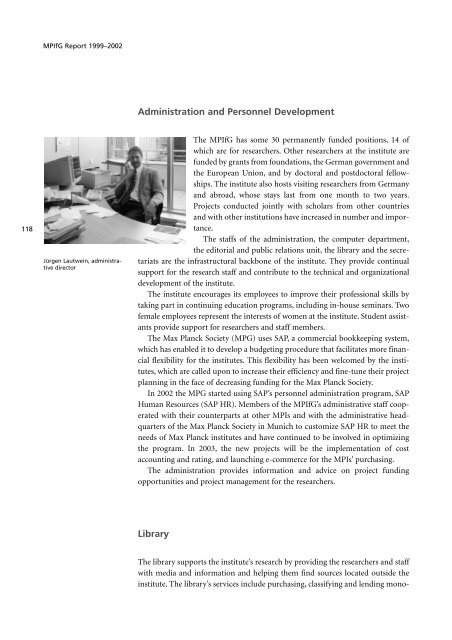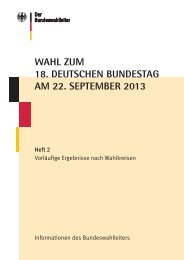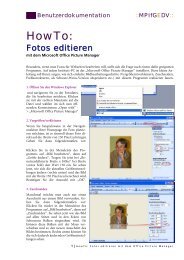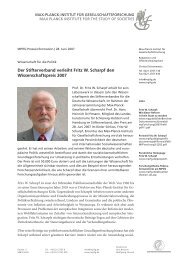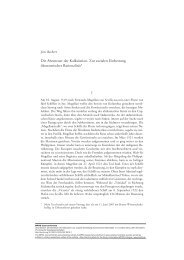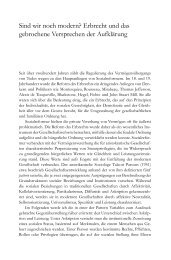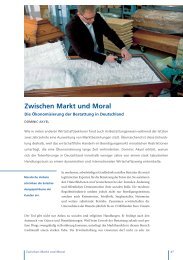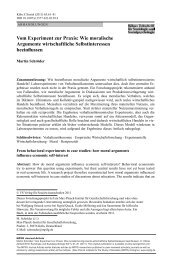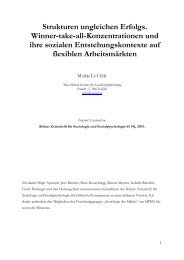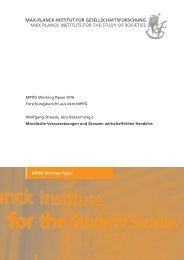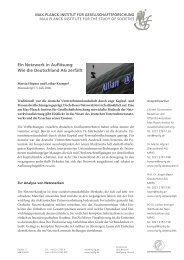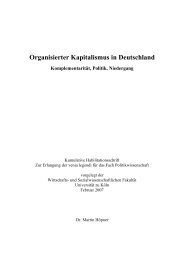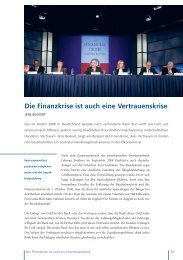Publications - MPIfG
Publications - MPIfG
Publications - MPIfG
You also want an ePaper? Increase the reach of your titles
YUMPU automatically turns print PDFs into web optimized ePapers that Google loves.
118<br />
<strong>MPIfG</strong> Report 1999–2002<br />
Jürgen Lautwein, administrative<br />
director<br />
Administration and Personnel Development<br />
The <strong>MPIfG</strong> has some 30 permanently funded positions, 14 of<br />
which are for researchers. Other researchers at the institute are<br />
funded by grants from foundations, the German government and<br />
the European Union, and by doctoral and postdoctoral fellowships.<br />
The institute also hosts visiting researchers from Germany<br />
and abroad, whose stays last from one month to two years.<br />
Projects conducted jointly with scholars from other countries<br />
and with other institutions have increased in number and importance.<br />
The staffs of the administration, the computer department,<br />
the editorial and public relations unit, the library and the secretariats<br />
are the infrastructural backbone of the institute. They provide continual<br />
support for the research staff and contribute to the technical and organizational<br />
development of the institute.<br />
The institute encourages its employees to improve their professional skills by<br />
taking part in continuing education programs, including in-house seminars. Two<br />
female employees represent the interests of women at the institute. Student assistants<br />
provide support for researchers and staff members.<br />
The Max Planck Society (MPG) uses SAP, a commercial bookkeeping system,<br />
which has enabled it to develop a budgeting procedure that facilitates more financial<br />
flexibility for the institutes. This flexibility has been welcomed by the institutes,<br />
which are called upon to increase their efficiency and fine-tune their project<br />
planning in the face of decreasing funding for the Max Planck Society.<br />
In 2002 the MPG started using SAP’s personnel administration program, SAP<br />
Human Resources (SAP HR). Members of the <strong>MPIfG</strong>’s administrative staff cooperated<br />
with their counterparts at other MPIs and with the administrative headquarters<br />
of the Max Planck Society in Munich to customize SAP HR to meet the<br />
needs of Max Planck institutes and have continued to be involved in optimizing<br />
the program. In 2003, the new projects will be the implementation of cost<br />
accounting and rating, and launching e-commerce for the MPIs’ purchasing.<br />
The administration provides information and advice on project funding<br />
opportunities and project management for the researchers.<br />
Library<br />
The library supports the institute’s research by providing the researchers and staff<br />
with media and information and helping them find sources located outside the<br />
institute. The library’s services include purchasing, classifying and lending mono-


